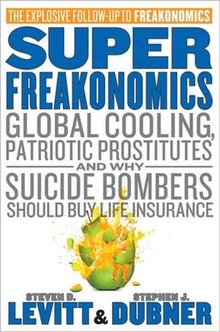In Super-Freakonomics, economists Steven Levitt and Stephen Dubner
explore the logic and science of various phenomena. In the first half, such
phenomena included climate change, natural human hate, and prostitution. This
book is a sequel to the incredibly popular Freakonomics,
which is considered a must-read for economists and math-fanatics alike. One
example of their analysis involves examining the ethics of prostitution. The
authors compare free, legal sex to a socialist concept, and prostitutes who
turn sex into an industry are being capitalist American patriots. Of course,
the fact that prostitution is a black market also ha a major effect on the
business.
It is important to be critical
when reading, even when you’re reading something from authors as successful as
Levitt and Dubner. As experienced and knowledgeable as they are, they can make
mistakes. In the section dedicated to climate change, they commit some
significant logical fallacies. The chapter is presented as a response to Al
Gore, a famous political advocate for change to combat global warming. The
authors present scientists who disagree with Gore’s claims and play it as a rebuttal
from science against Al Gore. However, a truly scientific point of view would
have mentioned how scientists overwhelmingly agree that Gore is correct in his
fears. The authors are committing a confirmation bias logical fallacy by only
examining evidence that supports the view the authors clearly had prior to
their research.
After reading the climate-change
chapter, it is difficult to accept what the authors say. Climate change (for
some odd reason) is a political issue, and perhaps the authors were biased for
political reasons. However, in the previous book, the authors made an argument
for legal abortion, which would come from the opposite side of the political
spectrum. Perhaps, instead, the authors are motivated to have an “everything
you know is wrong” attitude in order to seem like enlightened spreaders of
truth over inferior mortals (the audience), in which case, they are not to be
trusted.
